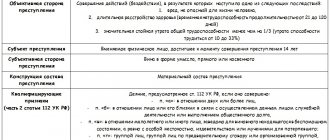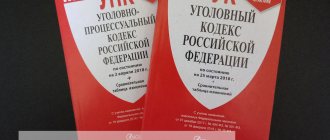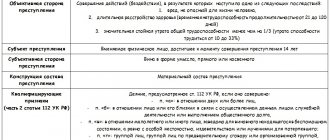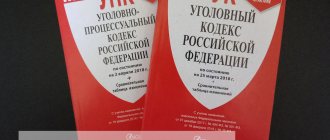ST 116 of the Criminal Code of the Russian Federation.
Beatings or other violent actions that caused physical pain, but did not entail the consequences specified in Article 115 of this Code, committed out of hooligan motives, as well as for reasons of political, ideological, racial, national or religious hatred or enmity, or for reasons of hatred or enmity in in relation to any social group, -
shall be punishable by compulsory labor for a term of up to three hundred sixty hours, or correctional labor for a term of up to one year, or restriction of liberty for a term of up to two years, or forced labor for a term of up to two years, or arrest for a term of up to six months, or imprisonment for a term of up to two years.
Article for beating a minor child
There is no separate article in the Criminal Code for causing harm to a minor. However, the fact of beating a minor is an aggravating circumstance.
Important. A child under 14 years of age is considered a minor, and from 14 to 18 years of age is considered a minor.
You are advised by the best qualified lawyers
Free: Our lawyers provide free initial consultation on any legal issues. 90% of cases are resolved with one free consultation.
24/7: real estate via online chat, or call the hotline 24 hours a day, 7 days a week
The punishment for beating a young child depends on the amount of harm caused:
- clause "b" part 2 art. 111 of the Criminal Code - a criminal can be imprisoned for 10 years;
- clause "c" part 2 art. 112 of the Criminal Code – deprivation of freedom for 5 years;
- clause "g" part 2 art. 117 the offender is imprisoned from 3 to 7 years.
Note!
According to Art. 63 of the Criminal Code, any violation of the law in relation to children under 18 years of age is always considered an aggravated violation. Consequently, the punishment changes upward.
Motives
The motives for committing a crime can be different. This could be personal hostility, hooliganism, ideological, racial, national enmity or rejection of some social group.
Some issues, such as the concept of hooliganism and its distinctive features, are discussed in Resolution of the Plenum of the Supreme Court No. 45 of November 15, 2007. The document defines that only gross violations of public order, generally accepted norms, or when they are committed for reasons of ideological, racial, national hostility, or when weapons were used to commit them, become hooligans.
Although a separate article is provided for in the Criminal Code to qualify hooliganism specifically (Article 213 of the Criminal Code), in a situation where it involves beatings, Art. 116 of the Criminal Code. Since, in accordance with paragraph 13 of the Resolution of the Plenum of the Supreme Court, the commission of actions out of hooligan motives is distinguished by the focus on a person or his property and is defined as the commission of actions with hooligan motives.
According to the rules of clause e art. 63 of the Criminal Code, the presence of such motives as racial or national hatred, rejection of social groups is an aggravating circumstance when determining the amount of punishment for the offender. That is, if such motives are proven, then the amount of responsibility increases.
The adoption of such measures is associated with the definition of the state as the guarantor of human rights and freedoms, without division by gender, race, nationality of origin, religion, etc. according to Art. 19 of the Constitution of the Russian Federation.
Article of the Criminal Code of the Russian Federation for group beating
An offense committed by a group of people is punished much more severely than a crime committed alone. Assault is no exception.
The punishment in the form of imprisonment, according to the following articles, is:
- clause “a”, part 3, art. 111 Criminal Code – up to 12 years;
- item "g" part 2 art. 112 Criminal Code – up to 5 years;
- clause "e" part 2 art. 117 of the Criminal Code - from 3 to 7 years.
Note!
To be punished under these articles, there must be a prior agreement between the accused. If this is not established, then the charge is qualified under paragraph “c” of Part 1 of Art. 63 of the Criminal Code.
What is the penalty for light battery?
For causing minor injuries, the punishment is in accordance with Art. 115 of the Criminal Code. Damage to health is expressed in loss of ability to work for up to 3 weeks. The punishment is:
- fine of up to 40,000;
- compulsory work for up to 1 year;
- detention for up to 4 months.
Note!
Responsibility for the committed actions reflected in Art. 115 of the Criminal Code depends on whether there are aggravating circumstances in the actions. In this case, the offender may face prison for up to 2 years.
In addition to physical damage, beating causes material and moral damage. These actions may be subject not only to criminal liability, but also to filing a claim for damages.
Moderate battery article
Battery of moderate severity constitutes damage to health or loss of ability to work for a long period.
A person cannot fully perform his job, for example, drive a car, cook food, etc.
From a medical point of view, this is when internal organs and skin over large areas of the body are damaged. These injuries do not pose a threat to human life. This also includes mental disorder that occurs when in contact with a criminal.
Very often, due to ignorance of the laws, the victim cannot bring the criminal to justice.
The punishment for assault of moderate gravity is defined in Art. 112 of the Criminal Code and consists:
- restriction of freedom up to 3 years;
- forced labor for up to 3 years;
- arrest up to 6 months;
- imprisonment for up to 3 years.
What will happen to beating a person and stealing?
The punishment for the actions of the criminal for beating and theft depends on the amount of damage caused to the health of the victim.
Such actions without causing harm to health can be considered in accordance with clauses “a”, “d”, part 2 of Art. 161 of the Criminal Code, as robbery. Those. there is a group theft of property by prior conspiracy and with the use of violent actions, but not dangerous to health.
The punishment in this case is:
- forced labor for up to 5 years;
- imprisonment for up to 5 years;
- fines in the amount of the perpetrator’s monthly income with or without restriction of freedom for up to 1 year.
If damage to health is established, the actions of the perpetrators are considered robbery, in accordance with Part 2 of Article 162 of the Criminal Code. Those. the theft of property occurred with the use of violence that was dangerous to the health or life of the victim, or with threats to use violence, committed by a group of people by prior conspiracy.
Here the punishment is:
- imprisonment for up to 10 years and fines up to 1 million rubles.
- imposition of a fine in the amount of the offender’s income for five years and restriction of freedom for up to 2 years.
Qualifying signs of beatings
The qualifying signs of beating are the intentional infliction of minor harm to health. The motive for these actions is hooligan in nature. Since a criminal act has a material composition, it is necessary to establish a causal relationship between the actions of the offender and the occurrence of consequences.
Beatings
may be part of the objective side of another criminal act (for example, rape or robbery with violence). Such acts do not require independent qualification, since they are covered by the main feature - violence.
If, as a result of beating, light, medium or severe harm to health is intentionally caused, these acts are not assessed as beating. They are classified as harmful to health. If damage to health is caused due to negligence, the guilty person is held accountable for the consequences only when it is provided for by the Criminal Code, for example:
- Battery
, which through negligence caused minor damage to health, is qualified exclusively under Article
116 of the Criminal Code of the Russian Federation.
This is due to the lack of liability for causing minor harm to health through negligence. - Beatings that have developed into a serious criminal act (wounding, murder) are not additionally qualified under Article 116 of the Criminal Code of the Russian Federation
.
To correctly qualify the signs of a crime, you should seek help from a professional lawyer.
Criminal liability for battery with risk to life
The most common article under which the perpetrator is most often punished is Art. 116 of the Criminal Code. However, the victim often misses the deadline to contact law enforcement agencies, and therefore most of the evidence is lost:
- whether it was hooliganism;
- or the crime occurred for religious reasons or is related to the nationality of the victim;
- whether a weapon or the like of a weapon was used.
According to paragraph 2 of Art. 115 of the Criminal Code, either there can be an arrest for up to 180 days, or the period of arrest is extended to two years.
If there are systematic beatings, the penalty increases according to the following factors:
- number of perpetrators – from 2 people or more;
- the offender used torture or committed other acts that resulted in severe physical and moral harm;
- the criminal act is associated with racial and religious intolerance.
In this case, according to clause 2 of Art. 117 of the Criminal Code, the offender may lose his freedom for up to 7 years. In doing so, the court takes into account the following circumstances:
- how much time the victim needs to recover health;
- Traces of severe injuries were found on parts of the body;
- the person was beaten with particular cruelty;
- the target of the attack is the victim’s organs;
- the victim is a minor citizen;
In this case, the punishment is imprisonment for up to 10 years under strict conditions.
If the crime occurred with the participation of two or more perpetrators, the term is increased by another two years.
Note!
Each case of beating is unique in itself. Educational measures may take the form of correctional labor or penalties. The basis for making a correct decision by the court is an examination to identify the severity of the damage caused.
For minor injuries, the culprit will face up to 2 years of arrest. For average severity of beatings – up to 5 years. In case of severe beating, as a result of which the victim dies - 15 years in prison.
The Duma introduced amendments to the article on beatings declared unconstitutional
It is proposed to tighten the punishment under this part of the article. The government proposed the following sanctions options:
- compulsory work for up to 480 hours;
- correctional labor for up to one year;
- restriction of freedom for up to one year;
- arrest for up to six months.
Read on RBC Pro
No longer family: companies’ love for employees will end in 2022
Why couriers get paid more than accountants, but IT specialists cannot be found
It's Not Just Tesla: Insiders Have Dumped These 7 Stocks Over the Last Month
Why blueberry buyers in the United States have become like drug lords - Bloomberg
The Constitutional Court demanded changes to the Code of Administrative Offenses due to a dispute over a fine Society
Former State Duma deputy and one of the authors of the bill on the prevention of domestic violence Oksana Pushkina called the changes in the Criminal Code useful.
“Previously there was a big legal gap in this article. People convicted of this crime, in the absence of an administrative offense, were not punished under this article. Therefore, lawyer Marie Davtyan and her colleagues appealed to the Constitutional Court,” Pushkina told RBC.
At the same time, according to her, this decision does not cancel the need to adopt the law “On Domestic Violence.”
“The Russian Criminal Code enshrines the concept of beatings and punishment. And the law on domestic violence completely defines the conceptual apparatus and subject composition. Also, which is very important, (the law determines - RBC) the form and regulations for the actions of law enforcement agencies and other organizations whose actions will be aimed at protecting the rights of the injured party and rehabilitation. And, most importantly, the preventive measures prescribed in the bill will help in the future to avoid serious consequences for victims and aggressors,” Pushkina said.
The Constitutional Court ordered the State Duma to change the law on repeated beatings after a complaint from a resident of the Orenburg region, who, according to her statement, was systematically beaten by her brother. In 2021, the man was brought to administrative responsibility, and then to criminal liability, however, when in October 2021 he again beat his sister, having an outstanding criminal record, he was only brought to administrative responsibility, and was assigned 100 hours of compulsory work.
In April, the Constitutional Court ruled that systematic beatings are a “constitutive sign of torture,” liability for which is provided for in the Criminal Code. Repeated beatings, according to the Constitutional Court, as a crime carry an increased public danger and should be criminalized in any case.
A law decriminalizing domestic battery was passed and took effect in early 2021. “Battery” refers to actions that “caused physical pain, but did not entail consequences.” Beatings committed by close relatives for the first time were transferred from the category of criminal offenses to administrative offenses. They only face a fine of 30 thousand rubles, arrest for 15 days or correctional labor. Repeated incidents of violence remained criminal offences.
In February 2021, the Consortium of Women's Non-Governmental Associations reported that almost two-thirds (61%) of women killed in Russia in 2021 were victims of domestic violence - they died at the hands of a partner or relative.
How to bring to justice those who beat a person
A person who has been beaten must immediately file a complaint with the police department and receive a referral for a medical examination.
The application is drawn up in any form. It details the time and place of the incident, describes the harm caused, what was the basis for such actions, as well as the time and place of seeking medical help.
If there are witnesses, their details are indicated. In the end, the victim requests that the perpetrator be brought to justice.
Due to changes in the Criminal Procedure Code that occurred in 2007, when a victim contacts the police, he can expect that the culprit will be found and punished.
According to Art. 20 of the Code of Criminal Procedure of the case under Art. 115,116,129,130 are subject to consideration only at the request of the victim and they are classified as a private charge in criminal proceedings.
Note!
The case can be terminated after the parties have reconciled.
Battery is a light crime and is not prosecuted solely on the basis of the fact of the incident.
If the case is of an exceptional nature, then it can be initiated without a statement. For example, the victim is dependent on the perpetrator or cannot independently protect his interests.
The case is submitted to the magistrate for consideration after filing an application with the judicial authorities, or the prosecutor's office, or the police. All evidence of the criminal's guilt is presented to the court. The consideration of the case takes place in the presence of the accused and the accuser.
The end of the consideration of the case is the adoption of a decision or reconciliation of the parties. Reconciliation can only be achieved before the court retires to the deliberation room and with the consent of the victim and the perpetrator.
“Does not allow for the assignment of responsibility”
The rapist will not be nice: the law on domestic violence will be rewritten
Compared to the 2021 edition, the document will be significantly revised
The Constitutional Court sided with the victim. The ruling, issued on April 8 and published on the court’s website, states that Article 116 of the Criminal Code of the Russian Federation, neither in itself nor in the meaning of law enforcement practice, “does not allow the imposition of criminal liability on a person who has committed the act described in it after the period established by the article has expired.” 4.6 of the Code of Administrative Offenses of the Russian Federation, the period during which such a person was considered subject to administrative punishment.”
At the same time, the legislator “should not have ignored a previous conviction for this act, since it indicates an increased social danger,” and also indicates the stability of the perpetrator’s behavior and a tendency to resolve conflicts with violence. To an even greater extent, the inadequacy of the imposed administrative punishment and the failure of the state to fulfill its obligations to protect the individual is indicated by the fact that violence in all cases was used against the same person, the resolution emphasizes.
Third circle
Photo: TASS/dpa/Maja Hitij
“Thus, Article 116 of the Criminal Code of the Russian Federation does not comply with the Constitution of the Russian Federation. The legislator should make changes to the Criminal Code of the Russian Federation, as well as establish a compensatory mechanism for victims, in whose cases from the moment this resolution enters into force until the corresponding changes are put into effect, the challenged norm will be applied,” the document says.
A draft on a new procedure for conducting cases of libel and battery has been submitted to the State Duma
Since the law does not have retroactive effect, this decision does not lead to a review of Lyudmila Sakova’s case, but she may qualify for compensation, the decision notes.
This is not the first attempt to change current legislation regarding punishment for domestic violence. Thus, a few days earlier, the Supreme Court introduced a bill to the State Duma, according to which it is proposed to transfer cases of beatings and domestic violence from private to private-public prosecution. This means that such cases cannot be terminated by reconciliation of the parties. In addition, if now the victims themselves are obliged to collect evidence to confirm the fact of violence, after changes are made, representatives of law enforcement agencies will have to do this.
The ruling of the Constitutional Court was called a big victory by the human rights organization, which helps women facing violence and advocates the adoption of a law on domestic violence (at the request of the Ministry of Justice, the organization was included in the register of foreign agents).
Third circle
Photo: TASS/Sergey Fadeichev
“It really was a mistake, an inaccuracy in the legislation.” Because it is logical that new acts of violence should be punished more seriously than the first. And at the same time, for quite a long time we were in an absurd situation when a person for a third offense could receive the same punishment as for the first case,” O communications specialist Diana Barseghyan.
At the mercy of the family: a special project on how domestic violence has become a national threat
Why women's stories of male aggression should not remain a private matter



